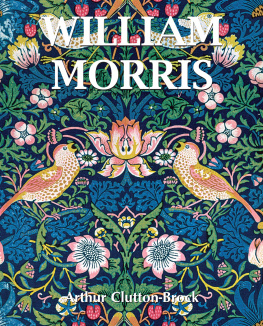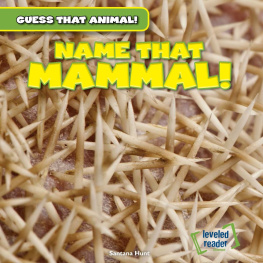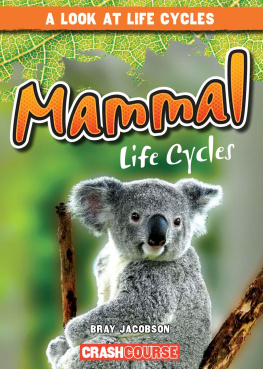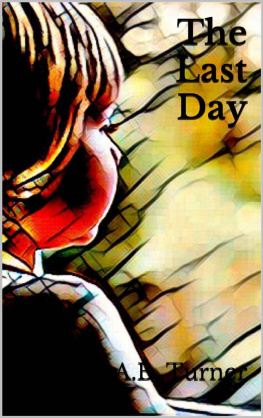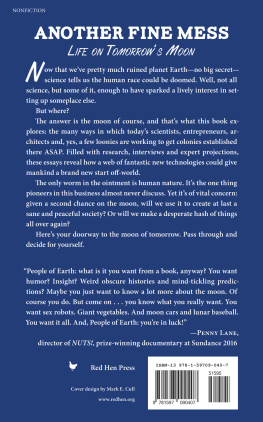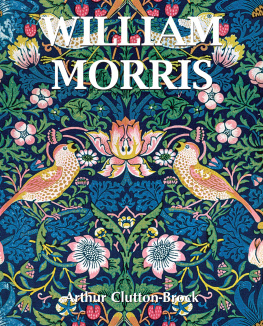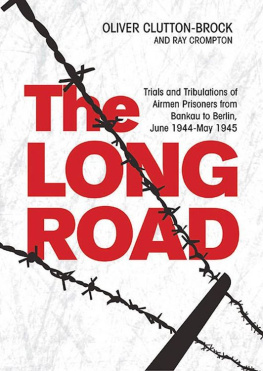Clutton-Brock - Mammal Societies
Here you can read online Clutton-Brock - Mammal Societies full text of the book (entire story) in english for free. Download pdf and epub, get meaning, cover and reviews about this ebook. City: Chichester;West Sussex, year: 2016, publisher: John Wiley & Sons, Incorporated, genre: Home and family. Description of the work, (preface) as well as reviews are available. Best literature library LitArk.com created for fans of good reading and offers a wide selection of genres:
Romance novel
Science fiction
Adventure
Detective
Science
History
Home and family
Prose
Art
Politics
Computer
Non-fiction
Religion
Business
Children
Humor
Choose a favorite category and find really read worthwhile books. Enjoy immersion in the world of imagination, feel the emotions of the characters or learn something new for yourself, make an fascinating discovery.

- Book:Mammal Societies
- Author:
- Publisher:John Wiley & Sons, Incorporated
- Genre:
- Year:2016
- City:Chichester;West Sussex
- Rating:3 / 5
- Favourites:Add to favourites
- Your mark:
- 60
- 1
- 2
- 3
- 4
- 5
Mammal Societies: summary, description and annotation
We offer to read an annotation, description, summary or preface (depends on what the author of the book "Mammal Societies" wrote himself). If you haven't found the necessary information about the book — write in the comments, we will try to find it.
Mammal Societies — read online for free the complete book (whole text) full work
Below is the text of the book, divided by pages. System saving the place of the last page read, allows you to conveniently read the book "Mammal Societies" online for free, without having to search again every time where you left off. Put a bookmark, and you can go to the page where you finished reading at any time.
Font size:
Interval:
Bookmark:
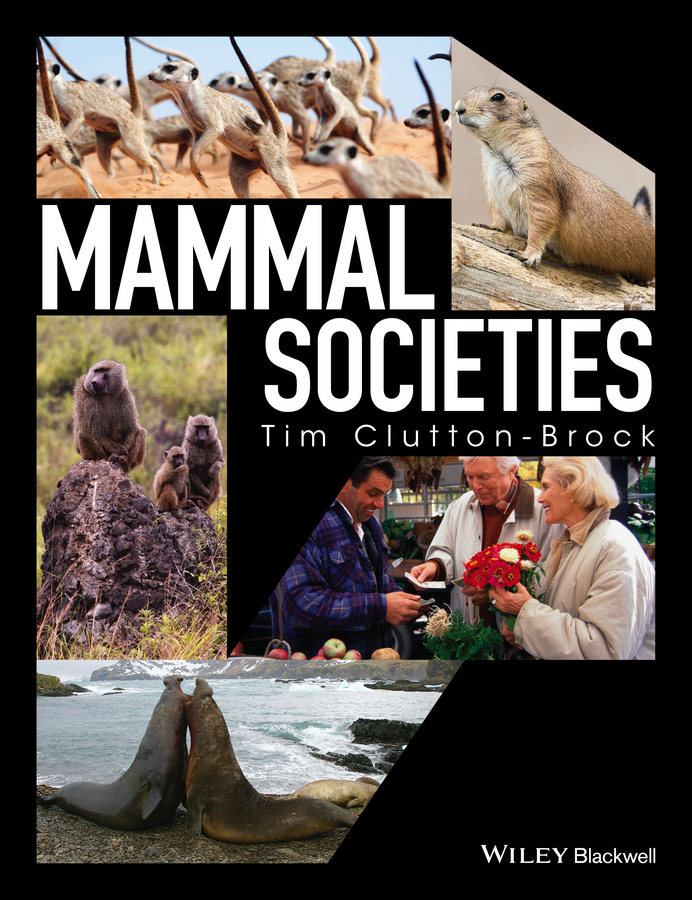
This edition first published 2016 2016 by Tim Clutton-Brock
Registered office: John Wiley & Sons, Ltd, The Atrium, Southern Gate, Chichester, West Sussex, PO19 8SQ, UK
Editorial offices: 9600 Garsington Road, Oxford, OX4 2DQ, UK
The Atrium, Southern Gate, Chichester, West Sussex, PO19 8SQ, UK
111 River Street, Hoboken, NJ 07030-5774, USA
For details of our global editorial offices, for customer services and for information about how to apply for permission to reuse the copyright material in this book please see our website at www.wiley.com/wiley-blackwell.
The right of the author to be identified as the author of this work has been asserted in accordance with the UK Copyright, Designs and Patents Act 1988.
All rights reserved. No part of this publication may be reproduced, stored in a retrieval system, or transmitted, in any form or by any means, electronic, mechanical, photocopying, recording or otherwise, except as permitted by the UK Copyright, Designs and Patents Act 1988, without the prior permission of the publisher.
Designations used by companies to distinguish their products are often claimed as trademarks. All brand names and product names used in this book are trade names, service marks, trademarks or registered trademarks of their respective owners. The publisher is not associated with any product or vendor mentioned in this book.
Limit of Liability/Disclaimer of Warranty: While the publisher and author(s) have used their best efforts in preparing this book, they make no representations or warranties with respect to the accuracy or completeness of the contents of this book and specifically disclaim any implied warranties of merchantability or fitness for a particular purpose. It is sold on the understanding that the publisher is not engaged in rendering professional services and neither the publisher nor the author shall be liable for damages arising herefrom. If professional advice or other expert assistance is required, the services of a competent professional should be sought.
Library of Congress Cataloging-in-Publication Data
Names: Clutton-Brock, T. H.
Title: Mammal societies / Tim Clutton-Brock.
Description: Chichester, West Sussex : John Wiley & Sons, Inc., 2016. | Includes bibliographical references and index.
Identifiers: LCCN 2015040498 | ISBN 9781119095323 (cloth)
Subjects: LCSH: Mammals.
Classification: LCC QL703 .C57 2016 | DDC 599--dc23 LC record available at http://lccn.loc.gov/2015040498
A catalogue record for this book is available from the British Library.
Wiley also publishes its books in a variety of electronic formats. Some content that appears in print may not be available in electronic books.
The core of Darwin's theory of natural selection is the realisation (based on Malthus's demographic projections) that the rate of population increase will inevitably lead to competition between individuals for resources and reproductive opportunities, and that competition will favour individuals that are well adapted to the environments they live in, with the result that their heritable characteristics will increase in future generations. Empirical research on population ecology since Malthus has provided extensive evidence to support Darwin's argument, while research in evolutionary biology and population genetics has confirmed that favourable mutations are likely to spread.
Natural selection adapts animals to the ecological niches that they occupy. Early explorations of animal adaptation mostly examined relationships between anatomical traits and the challenges imposed on different species by their physical environments. More recently, research has documented the impact of the social environment on the selection pressures operating on both sexes and on the evolution of behavioural, physiological and anatomical adaptations. In addition, an increasing range of studies have explored the consequences of contrasts in social organisation and the adaptations they generate for ecological processes within and between species, as well as for other areas of biology, including population genetics, epidemiology and conservation biology.
While there have been excellent reviews of the social behaviour of particular Orders of mammals, there have been few attempts to integrate research across mammalian groups and more extensive reviews of social organisation are available for ants and birds than for mammals. My aim in writing this book was to produce an integrated account of the evolution of mammalian societies within the framework provided by theoretical and empirical research on social evolution. As one of the main reasons for studying animal societies is to provide a general perspective on studies of the evolution of human societies, I particularly wanted to integrate research on primates with studies of other mammalian groups in order to explore the extent to which studies of non-human mammals (including non-primates as well as primates) provide insight into the evolution of hominin societies and human behaviour. Finally, as well as exploring the evolution of variation in the structure and organisation of mammalian societies, I wanted to examine what is known of the consequences of variation in social behaviour and breeding systems for ecological processes.
In contrast to birds, most mammals are polygamous and the structure of mating systems has important effects on the selection pressures operating on females and males and the distribution of sex differences in anatomy, physiology and behaviour. In many mammalian species, different factors determine the distribution of the two sexes: while the need to maintain access to adequate resources and to avoid predation commonly structures the distribution and behaviour of females, selection to maximise access to females often has a more important influence on the distribution and behaviour of males. As a result, although the behaviour of the two sexes coevolves, it is often useful to consider the behaviour of females and males separately. I have consequently organised the book to focus first on the behaviour and reproductive strategies of females and then on those of males. The first chapter provides a brief review of the body of theory relevant to the evolution of social behaviour that has built up over the last 40 years. provide an introduction to related research on the evolution of breeding systems and social behaviour in hominins and humans.
I owe an enormous debt to the large number of people that contributed in different ways to this book. In particular, I am deeply indebted to my wife, Dafila Scott, who has provided continuous support and encouragement; to Katy McAuliffe, who produced syntheses of material for six chapters and comments on others as well as vital encouragement at a time when progress had stalled; and to Penny Roth, who has typed, corrected and retyped all chapters multiple times.
For reading and for generous commenting on drafts that allowed me to improve them, I am grateful to Matt Bell (). Any mistakes that remain are, of course, my own. I am also grateful to a large number of people for helping me to locate suitable photographs or for allowing me to use their images.
Dieter Lukas regularly provided relevant papers and useful discussion. In the later stages of production, Bonnie Metherell, Rebecca Stanley, Alex Thompson, Tom Houslay, Gabrielle Davidson, Samantha Leivers and Andrew Szopa-Comley helped me to find photographs and references, and obtain permissions to use images and figures. A large number of colleagues helped me to locate relevant photographs, including Karen Strier, John Hoogland, Carel van Schaik, Tim Caro, Sarah Hrdy, Nigel Bennett, Elise Huchard, Robert Seyfarth, Claudia Fichtel, Dan Rubenstein and Kelvin Matthews. At Wiley-Blackwell, I am grateful to Ward Cooper who originally commissioned the book; to Jolyon Phillips for his meticulous copy-editing; to Kelvin Matthews for his role in organising permissions and in guiding the development of the manuscript; to Kathy Syplywczak for organising the text; and to Emma Strickland for arranging the cover design.
Next pageFont size:
Interval:
Bookmark:
Similar books «Mammal Societies»
Look at similar books to Mammal Societies. We have selected literature similar in name and meaning in the hope of providing readers with more options to find new, interesting, not yet read works.
Discussion, reviews of the book Mammal Societies and just readers' own opinions. Leave your comments, write what you think about the work, its meaning or the main characters. Specify what exactly you liked and what you didn't like, and why you think so.

